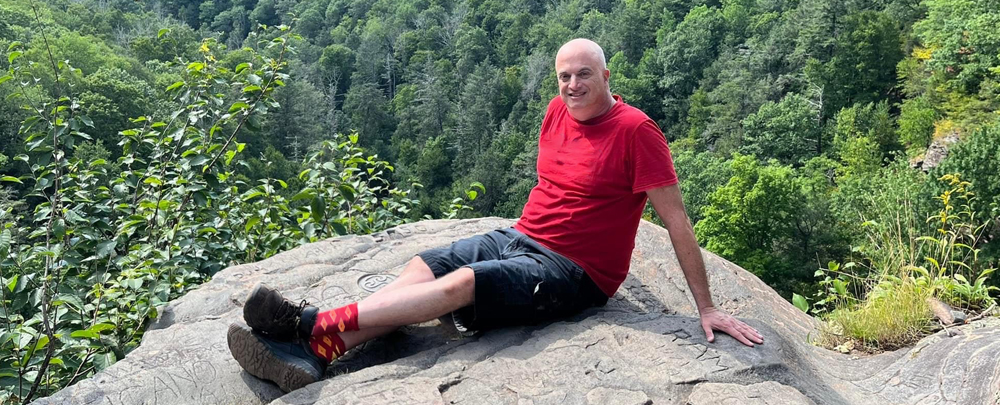Support Is Everything: Brian’s Mantle Cell Lymphoma Journey
September 22, 2023 Posted by: Eli Lilly and Company

In January 2021, Brian O’Sullivan wanted a fresh start for the new year. He scheduled a physical with bloodwork, despite feeling completely fine at the time and thinking he’d avoided getting sick throughout the COVID pandemic. But through his attempt to start the year off right, he soon discovered something was not so right.
His blood test showed an abnormally high white blood cell count, and his primary care physician suggested he come back in a month to have his blood tested again. When he returned and his blood was re-tested, his white blood cell counts had increased.
His doctor referred him to a hematologist. Unfamiliar with the term, Brian did some research and saw that hematologists don’t just treat blood diseases and disorders, but also cancer — and with that realization, Brian said “things became real.” When he went to a hematologist-oncologist one month later and saw “Cancer Center” written on the side of the building, things went from real to devastating in a flash.
“I thought, ‘This is where it all ends,’” Brian said.
After more tests, uncertainty and fear, Brian finally got a diagnosis. The news came from an app on his phone that had collected the results of his last test and sent him a notification: He had mantle cell lymphoma (MCL).
The Path to Treatment
MCL is a rare blood cancer and a form of non-Hodgkin lymphoma. It arises from cancerous B lymphocytes, a type of white blood cell, and affects the lymphatic system, which helps protect the body against infection and disease.1
Immediately after he learned he had MCL, Brian looked up the disease on the internet and was terrified by what he saw. He then turned to social media to see if there were any MCL support groups. He found people living with MCL across the world, in various stages of the disease. Some were on a watch-and-wait regimen, an approach that involves closely monitoring a patient's condition but not pursuing treatment until symptoms arise or change. Others were in remission.
Brian’s hematologist-oncologist suggested watch-and-wait for him and that he get a second opinion. Brian did so, and after more needles and tests, depression took root, and he began to live in fear.
“I was in the fetal position at night thinking my mother was going to bury me,” he said.
His second oncologist prescribed treatment with a Bruton’s tyrosine kinase (BTK) inhibitor, to begin in October 2021. But his insurance provider denied the therapy because BTK inhibitors were not approved for first-line treatment — which was difficult to hear, especially as his white blood cell counts jumped even higher.
“I thought I was dying and felt like no one would treat me,” he said.
He saw a third oncologist in December 2021, who referred him to another oncologist working on a clinical trial, and Brian visited their office. That oncologist, Brian’s fourth, ran tests and reviewed his case, and in February 2022, Brian wept in relief when he learned he was qualified to participate in the trial.
“I cried out about 80% of my depression that day,” he said.
Finding Support — and Giving It
The trial effectively treated Brian’s MCL, but his mental and emotional recovery was far from over.
Along with support from his family, finding a community — including those support groups he’d found after he was diagnosed — was instrumental. He met “so many” people with blood cancer who understood what he was going through. He began to share his story across social media, which he hadn’t used often before his diagnosis, and realized he wanted to work with others who had been affected by cancer.
Now, Brian has devoted his life to this mission. As an Advocacy Ambassador for The Leukemia & Lymphoma Society (LLS), Brian helps people who have been newly diagnosed and emphasizes the importance of talking to others, whether fellow patients, family or medical professionals, and hopes to become a full-time patient advocate one day.
“No one knows you’re going through something until you talk about it,” he said.
Brian also participates in local events through LLS. He is looking forward to the next time he’ll get to connect with others experiencing blood cancer — and sees life as a gift.
“I’m grateful for every day that I win and cancer doesn’t,” Brian said.
For information and resources on MCL and other blood cancers, visit The Leukemia & Lymphoma Society at LLS.org/patient-support and the Lymphoma Research Foundation at Lymphoma.org.
1. National Organization for Rare Disorders. Mantle cell lymphoma. Available at: https://rarediseases.org/rare-diseases/mantle-cell-lymphoma/. Accessed July 31, 2023.
